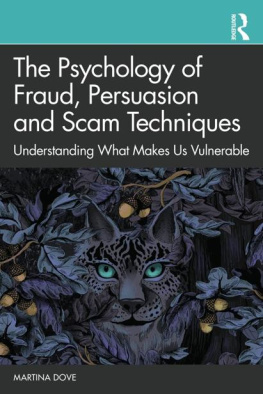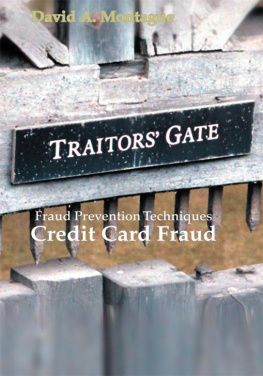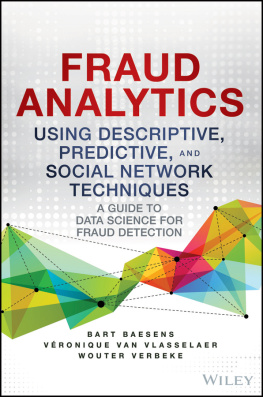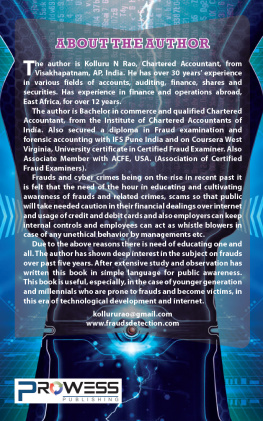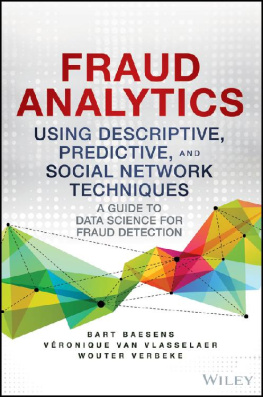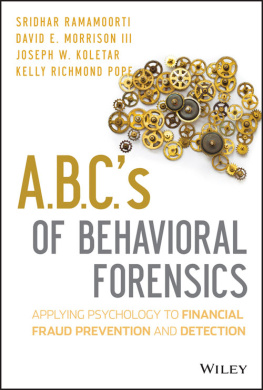
This book is an engaging study of the modern- day plague of internet, email and personal scams, so often targeted at the most vulnerable in society.
Written in an accessible style, the book combines the personal and the
scientific. Retelling everyday examples, it offers a captivating account of how we fall victim to fraud and theft, and suffer their emotional consequences
because we fail to recognise the traps of deception. Dove dissects the
evidence, and rooting her account in scientific theory, she urges the reader to learn and prepare to detect the fraud instead of succumbing to it.
Dr Andreas Cebulla, Associate Professor, Flinders
University of South Australia
Dr Dove has produced a comprehensive but accessible text that summarizes
the current social science research on frauds and scams. The chapters progress logically from defining fraud in all its variations, to describing the process by which victims are defrauded, to offering solutions and preventative
measures. The case studies she presents are exceptional and provide the
reader with real- world examples. As a professor and a public educator,
I believe this book could be used in a classroom, by working professionals,
and citizens who wish to protect themselves from frauds and scams.
Dr Roderick Graham, Associate Professor of Sociology and
Criminal Justice, Old Dominion University
An exceptional piece of work that unpacks what it is to be a victim, an
observer and even a perpetrator of different types of fraud. What Dr Dove has managed to do here is remarkable, giving astute academic analysis alongside
practical advice, examples and explanations in a definitive resource on both the art and science of the scam.
Jenny Radcliffe, Director, Human Factor Security
A fabulously interesting read. Dr Martina Dove provides a window into the
methods of criminals whilst giving a valuable insight into how criminals use our emotional responses to defraud. This is a book for all, fraud prevention professionals, academics and the public. This book could assist in stopping
you and those around you from becoming a victim to this despicable crime.
Tony Murray, Former National Economic Crime and Fraud Protect
Officer for National Lead Force, City of London Police

The Psychology of Fraud, Persuasion
and Scam Techniques
The Psychology of Fraud, Persuasion and Scam Techniques provides an in-depth explanation of not only why we fall for scams and how fraudsters use
technology and other techniques to manipulate others, but also why fraud
prevention advice is not always effective.
Starting with how fraud victimisation is perceived by society and why
fraud is underreported, the book explores the different types of fraud and
the human and demographic factors that make us vulnerable. It explains
how fraud has become increasingly sophisticated and how fraudsters use
communication, deception and theories of rationality, cognition and judg
mental heuristics, as well as specific persuasion and scam techniques, to
encourage compliance. Covering frauds including romance scams and
phishing attacks such as advance fee frauds and so- called miracle cures, the book explores ways we can learn to spot scams and persuasive communication, with checklists and advice for reflection and protection.
Featuring a set of practical guidelines to reduce fraud vulnerability, advice on how to effectively report fraud and educative case studies and examples,
this easy- to- read, instructive book is essential reading for fraud preven
tion specialists, fraud victims and academics and students interested in the psychology of fraud.
Martina Dove is a researcher with a fervent passion for fraud prevention, specialising in fraud vulnerability, individual characteristics that make
people vulnerable to fraud and scam techniques used by fraudsters.

The Psychology of Fraud,
Persuasion and Scam
Techniques
Understanding What Makes Us
Vulnerable
Martina Dove
First published 2021
by Routledge
2 Park Square, Milton Park, Abingdon, Oxon OX14 4RN
and by Routledge
52 Vanderbilt Avenue, New York, NY 10017
Routledge is an imprint of the Taylor & Francis Group, an informa business
2021 Martina Dove
The right of Martina Dove to be identified as author of this work has been asserted by her in accordance with sections 77 and 78 of the Copyright, Designs and Patents Act 1988.
All rights reserved. No part of this book may be reprinted or reproduced or utilised in any form or by any electronic, mechanical, or other means, now known or
hereafter invented, including photocopying and recording, or in any information storage or retrieval system, without permission in writing from the publishers.
Trademark notice: Product or corporate names may be trademarks or registered trademarks, and are used only for identification and explanation without intent to infringe.
British Library Cataloguing- in- Publication Data
A catalogue record for this book is available from the British Library
Library of Congress Cataloging- in- Publication Data
A catalog record has been requested for this book
ISBN: 978- 0- 367- 85957- 2 (hbk)
ISBN: 978- 0- 367- 85956- 5 (pbk)
ISBN: 978- 1- 003- 01599- 4 (ebk)
Typeset in Sabon
by Newgen Publishing UK
To fraud victims everywhere. It is not your fault, it is a crime.
May you find your voice to tell your stories proudly.

Contents
x Contents
Contents xi
It is my pleasure to introduce Martina Doves excellent book. She was a
celebrity in fraud and scam research even before she completed her PhD,
being in regular contact with the main players in this field of study and
active within the community for fraud advice. The book reflects both her
scholarly knowledge and the rich repertoire of cases that she has come in
contact with.
The book is a compact but exhaustive overview of different types of
frauds and scams, from the famous Nigerian ones to romance scams to
identity theft; it further covers the fraudsters manipulative techniques and the psychological processes that make us vulnerable. As such, it is not only a journey through this ever- growing criminal activity but also a crash course in social psychology: classic and novel studies are explained with accessible language illuminating fraud as a social and psychological phenomenon,
making for a fascinating excursion into communication, trust and decep
tion, decision- making and different personality characteristics that can play a role in fraud victimisation.
The sheer number of successful frauds and scams tells us that this is by
no means something that the average person easily avoids. Such deceptions
can be highly complicated machineries and there are many different factors
involved in the different phases, from preparation to aftermath. This innovative book follows the fraud process in all its stages, explores the different practical and psychological aspects for each stage, and proposes a model
Next page
